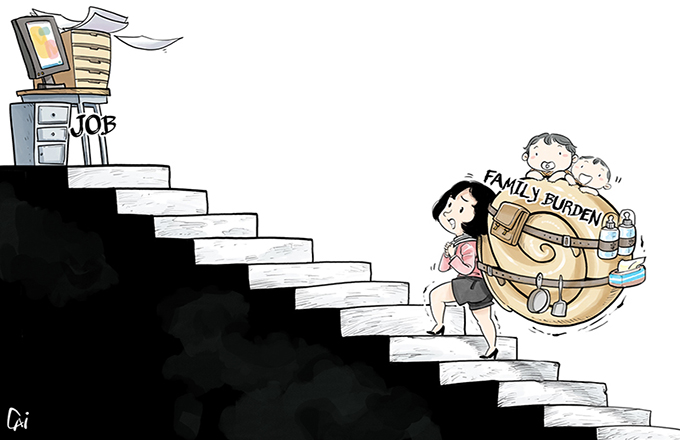Love's labor's not lost on today's youths
A guideline on how to deal with youths’ love affairs and marriages jointly issued by the Central Committee of the Communist Young League, Ministry of Civil Affairs and the National Health and Family Planning Commission has gone viral on the internet, as it tends to turn a private matter into a social issue.
The recently issued document seems to be an official response to some recent incidents involving youths’ love affairs and marriages. Media outlets have reported some cases of fraud, even tragedies, related such love affairs and marriages. Fearing that youths are falling prey to Mammon, as many demand a house and a car to get married, the document aims to help youths to inculcate the right values in their relationships to facilitate social stability and harmony.
The authorities’ intention is good, and they should be praised for putting an important social problem in the spotlight. But first we should find out what the problem is and what the youths think about it.
Critics generally say many people have remained single because they have laid too much importance on “money” even when choosing a life partner. It is indeed sad that after several decades of hard-earned “freedom to love”, blind dates to choose a life partner have become popular in China.
Technically speaking, going on a blind date is also a form of freely choosing a life partner. The question is, despite the basic consensus that marriage should be based on love, blind date organizers give top priority to the two parties’ material conditions, such as property, income, educational qualification and even family background, instead of what really matters in marriage: love, understanding, morality and common interests.
From this perspective, blind dating platforms are rightly criticized for ignoring the significance of marriage, and turning it into a kind of trade. Still, simple explanations such as “money worship has spread”, and “men are not what they used to be” are not convincing enough definitions for today’s youths. That “feelings” and “love”, eulogized in poetry, novels and dramas for thousands of years, have given way to money so easily is the real disturbing factor.
In Abraham Maslow’s motivation theory pyramid, the two lowest levels, and thus of the greatest importance to humans, are physiological and safety needs. Among all the life’s needs, people first try to meet their physical and emotional safety needs. In particular, life’s necessities include housing.
If we see the problem from a different perspective, we’ll realize that today’s youths have not become more utilitarian than before, instead their actions are dictated by severe pressure they face — much greater than what their predecessors faced — to lead a decent life. They live in a world where diplomas’ value depreciates while housing prices boom. For them, getting married doesn’t only mean living happily with a person they love, but also being able to afford the costs of living, paying millions of yuan for housing and taking care of four parents and perhaps two children.
Taking the moral high-ground to say today’s youths have become exceptionally money-minded will not help solve the real problems they face in getting married. Instead, some public policies that provide actual services and aid may help ease the increasing burden on the youths and prompt them to marry for love, not money. For instance, some cities have implemented policies to promote public rental housing to make renting a house a feasible and affordable option to meet people’s basic housing need, which may help to ease the youths’ heavy burden of buying a house before marriage.
Making the youths “dare to love” by putting in place a sound social security system may be a more effective way of helping them succeed in love, leading to marriage.
The author is a writer with China Daily.
wangyiqing@chinadaily.com.cn



















